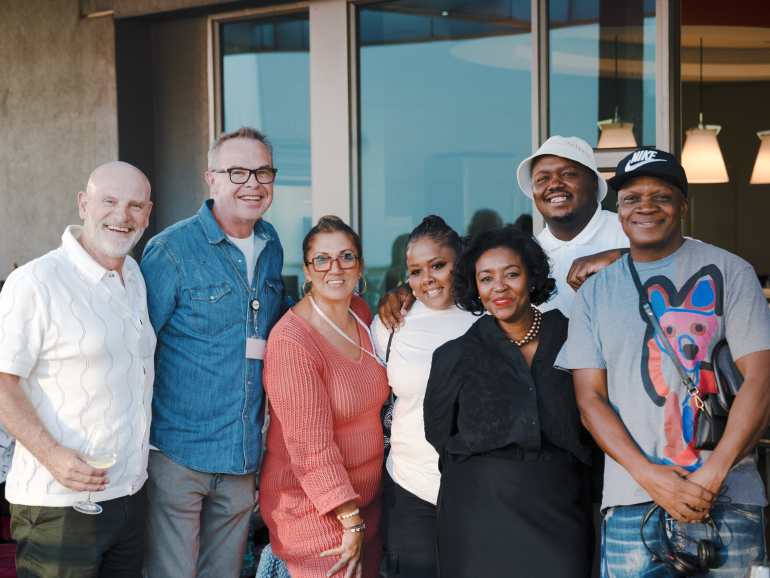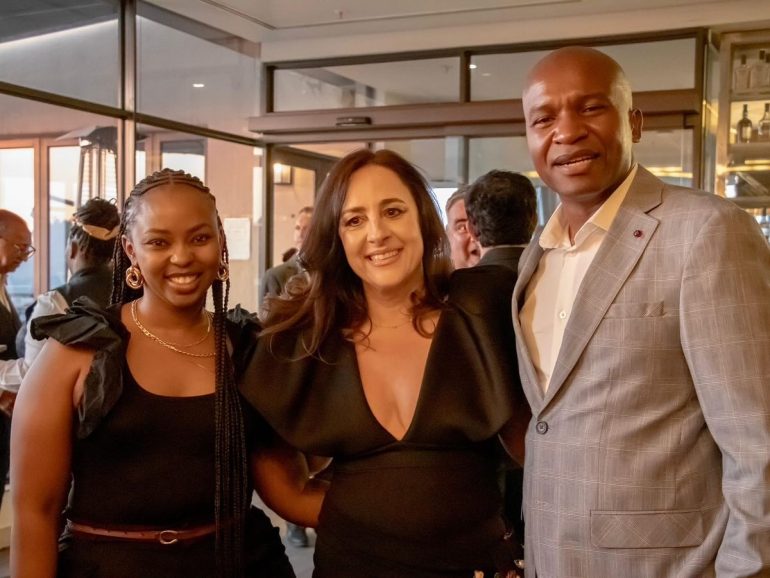- home Home
- keyboard_arrow_right PRESS OFFICE
- keyboard_arrow_right Posts
- keyboard_arrow_rightAn encounter with President Nelson Mandela
An encounter with President Nelson Mandela
29 years ago I had my first encounter with Nelson Mandela. I was the News Editor at Capital Radio at the time and we had been waiting for his arrival home in Soweto. We had been briefed that he wouldn’t go to Winnie’s mansion, but would return to his little house on the corner of Vilakazi and Ngakane Streets in Orlando West, Soweto. We’d also been told there was a chance to interview him.
One of my closest friends, Ian Phillips, had been a courier for the ANC for many years and told us that Capital Radio was a popular station among the exiles in Lusaka, listening on shortwave. So we thought we had a good chance of getting one of the first interviews.
We were a bit surprised at how fast events unfolded when the call came through to the Capital newsroom, instructing us to be at the Vilakazi Street house within 10 minutes for an interview. My colleague James Lorimer and I raced to Soweto. By then we had covered so much township violence and the build up to Mandela’s release that we knew all the quick back routes to Orlando West. We were there within 20 minutes, where things were running late.
The street party which had begun on the day of Mandela’s release was still raging, and Vilakazi Street was jammed with people. We abandoned our car and walked up the road to the Mandela house. If you’ve ever been to the house which is now a museum and looked at the old photos on display you’ll see the precast wall that used to surround the premises and the little gate which stood where the main entrance to the museum is today.

We fought our way to the gate and announced our arrival to the cadres manning it. Next to us, the American broadcaster Ted Koppel was also trying to present his credentials with his strident producers. Koppel was the anchor of Nightline, one of the biggest current affairs show on US television, and he and his crew were demanding access to Mandela. We were all pushed away.
A few minutes later, one of the cadres opened the gate and pointed in our general direction. “You! Come in!” he shouted. Ted Koppel and his producer rushed forward. The cadre blocked them and pointed to James and I. “No, you! Capital Radio!” We were ushered in, very amused that we were in ahead of the great Ted Koppel.
We were now standing in the little front garden under a huge tree. It has since been chopped down, but in one of the photos at the museum, a young Mandela is pictured in the shade of that once-magnificent tree. I was very keen to snoop around inside the house, but we were told that the interview would take place in the garden. Des Latham from Radio 702 arrived as did a few other local journalists. Our exclusive was no longer exclusive, but that wasn’t a problem. We just wanted to meet the man.
Suddenly there was a loud booming laugh and there was Mandela standing in his front doorway. He was being introduced to one of his neighbours, whom he was meeting for the first time in 30 years. Mandela was teasing the man about how old he had become. “You are so grey!” he jeered, rubbing his own grey hair. I can picture that moment now as I write about it. I remember being surprised by how tall Mandela was, and how he dominated the occasion. He had such a remarkable presence.
It was the afternoon and predictably there was a sudden Highveld thundershower. Mandela was whisked indoors, while the journalists huddled under the tree for shelter. We were told the interview would be held in the lounge. I could now snoop around.
I barged into the house, which has changed now that it’s a museum. Some of the walls have been knocked down to re-create the house as it was in 1947. In 1990, the lounge area was a lot bigger and the walls were lined with pine wood.
We were shown into the lounge, where Mandela was sitting on a couch with Valli Moosa, then a prominent leader of the United Democratic Front. Moosa was reading the newspaper to Mandela who had left his reading glasses at Victor Verster prison. When Mandela saw us enter, he clambered to his feet. “Oh hello, pleased to meet you. My name is Nelson Mandela,” he said, stretching out a hand.
We introduced ourselves and settled down for the interview. Des and James took turns to ask questions so that both radio stations got an interview. I have no recollection of what was discussed. I know that seems a bit ridiculous now – the conversation really should have made an impact – but I recall that we didn’t get anything new. Mandela had already given his address at the Cape Town City Hall and held a news conference at Archbishop Tutu’s house, and the message was much the same.
Before we started the interview, we were told that no photographs were allowed because we were radio journalists. The instruction made no sense, but we hadn’t brought a camera anyway. These weren’t the days of cameras being so ubiquitous. As we got up to leave, I handed Mandela my reporter’s notebook and asked him to sign a blank page. I said to him that I had only ever asked sportsmen for their autographs. He laughed and said: “I’ll sign it as a former boxer.”
He wrote: “To David O’Sullivan. With compliments and best wishes. NR Mandela”. I gave the book back to him and asked him to write the date and venue. He was amused and asked why. I told him that one day many people would have his autograph, but few would get it three days after his release at his Soweto house. That piece of paper is now one of my most treasured possessions. What I enjoy is that Mandela put an “R” in the signature, for Rolihlahla. He subsequently changed his signature to exclude the R. It makes my version somewhat unique.
I subsequently attended many news conferences with Nelson Mandela, including one where he questioned me in some detail about the Bisho massacre, which I had recorded. I remember him being a stern man. I remember him sometimes getting annoyed at questions with which he didn’t agree. I remember him being always quick to laugh and joke when the occasion was right. The memory of that meeting with Mandela 29 years ago today at his little Soweto home is forever preserved. The signed page from my notebook has been vacuum sealed and framed and hangs on the wall. I see it every day. I think of it as a family heirloom.
Written by: Zuko
Breakfast with David David O Sullivan Kaya 959 Nelson Mandela Rivonia Trailist
Similar posts
MORE ARTICLES

‘You are my heart in human form’: Lungile Thabethe’s touching letter to her daughter

Smart tax moves: A guide to boosting your tax refund

‘My husband won’t back me up when I discipline his kids’ – The Blind Spot

Kai Cenat graces the cover of Time Magazine’s first-ever TIME100 Creators List

Tebogo Thobejane pens emotional tribute to son on his 18th birthday
QUICK LINKS
UpComing Shows

959 Music Weekdays
Kaya 959 Hits
Real. Familiar. Memorable. Kaya 959 brings you the music you know and love from our playlist. Uninterrupted. Thursdays 20h00 to 21h00
close
The Best T in the City
With T Bose
He has held it down in the world of mid-morning radio with the best music, riveting topics, brilliant mixes and interesting guests. Every weekday, The Best T proves why he is the BEST by connecting to you like only your bro or favourite uncle could. He lets his listeners dictate the songs they want to hear in the ever-popular Top 10 at 10, and his Three Teaspoons never run out. Catch The Best T in the City Mondays to Fridays from 09h00 to 12h00.
close
Feel Good
With Andy Maqondwana
Feel good about feeling good! That's exactly what The Feel-Good show is about. An escape from the negativity that surrounds us, indulging you in good feels. Pass it on to one and all. Spread the good feeling around Gauteng with Andy Maqondwana.
close
The Hive
With Bonolo "Bee Sting" Molosiwa
Every "Hive" needs a Queen B and Bonolo "Bee Sting" Molosiwa is Kaya 959's honey who brings in the money. With her bubbly personality, infectious laugh, Bee Sting radiates positive energy which is all you need to get your weekend off to the best start. Don't miss the Afrobeat Dancehall Ragga (ADR) Top 10 on The Hive with Bee Sting every Saturday from 18h00 - 21h00.
closeConnect with Kaya 959
DownLoad Our Mobile App
© 2025 Kaya 959 | On The Street On The Air










